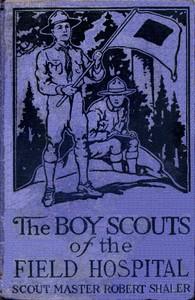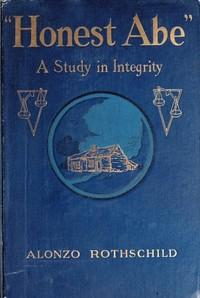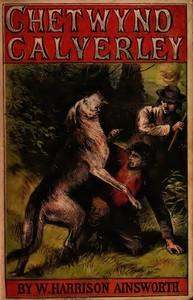Read this ebook for free! No credit card needed, absolutely nothing to pay.
Words: 182128 in 106 pages
This is an ebook sharing website. You can read the uploaded ebooks for free here. No credit cards needed, nothing to pay. If you want to own a digital copy of the ebook, or want to read offline with your favorite ebook-reader, then you can choose to buy and download the ebook.
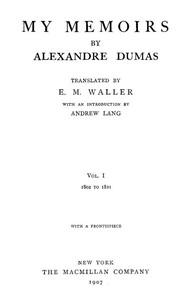

: My Memoirs Vol. I 1802 to 1821 by Dumas Alexandre Lang Andrew Author Of Introduction Etc Waller E M Emily Mary Translator - Dumas Alexandre 1802-1870
The true collaborators of Dumas were human nature and history. Men are eternally interesting to men, but in historical writing, before Scott, the men were left much in the vague. They and their deeds and characters lay hidden in memoirs and unprinted letters. Such a man as the Cavalier, Edward Wogan, "a very beautiful person," says Clarendon, was briefly and inaccurately touched on by that noble author. More justice is done to him by his kinsman, the adventurous Sir Charles Wogan, in a letter to Swift. He did not escape Scott, who wrote a poem to his memory. Now, such a character as Wogan, brave, beautiful, resourceful as d'Artagnan, landing in England with the gallows before his eyes, and carrying a troop of cavalry through the hostile Cromwellian country, "wherever might lead him the shade of Montrose," to join the Clans and strike a blow for King Charles, was precisely the character for Dumas. Such men as Wogan, such women as Jane Lane and Lady Ogilvy, Dumas rediscovered, and they were his inspiration. The past was not really dull, though dull might be the books of academic historians. They omitted the human element, the life, the colour, and, we are told, "scientific history" ought to be thus impartially jejune. The great public turns away from scientific history to Dumas and to modern imitators, good and bad, and how inordinately bad some of his followers can be! An American critic half despairs of his country because some silly novels, pretending to be historical, are popular. The symptom is good rather than bad. Untrained and undirected, falling on the stupid and ignorant new novels most loudly trumpeted, the young Americans do emancipate themselves from the tyranny of to-day, and their own fancy lends a glamour to some inept romance of the past. They dwell with tragedy and with Mary Stuart, though she be the Mary Stuart of a dull, incompetent scribbler. They may hear of Scott and Dumas, and follow them.
Dumas was at the opposite pole from a Galahad or a Joseph. His life, as regards women, was much like that of Burns or Byron. His morality on this point is that of the camp or of the theatre in which he lived so much. This must be granted as an undeniable fact. But there are other departments of conduct, and in the virtues of courage, devotion, fortitude, friendship, and loyalty, the Musketeers are rich enough. Their vices, happily, are not those of our age but of one much less sensitive on certain points of honour, as Dumas remarks, and as history proves. But the virtues of the Musketeers are, in any age, no bad example.
ANDREW LANG.
THE MEMOIRS OF ALEXANDRE DUMAS
BOOK I
My birth--My name is disputed--Extracts from the official registers of Villers-Cotterets--Corbeil Club--My father's marriage certificate--My mother--My maternal grandfather--Louis-Philippe d'Orl?ans, father of Philippe-?galit?--Madame de Montesson--M. de Noailles and the Academy--A morganatic marriage.
I was born at Villers-Cotterets, a small town in the department of Aisne, situated on the road between Paris and Laon, about two hundred paces from the rue de la Noue, where Demoustier died; two leagues from La Fert?-Milon, where Racine was born; and seven leagues from Ch?teau-Thierry, the birthplace of La Fontaine.
I was born on the 24th of July 1802, in the rue de Lormet, in the house now belonging to my friend Cartier. He will certainly have to sell it me some day, so that I may die in the same room in which I was born. I will step forward into the darkness of the other world in the place that received me when I stepped into this world from the darkness of the past.
I was born July 24th, 1802, at half-past five in the morning; which fact makes me out to be forty-five years and three months old at the date I begin these Memoirs--namely, on Monday, October the 18th, 1847.
I therefore ask permission to transcribe my birth certificate, to allay any further discussion upon the subject.
"On the fifth day of the month of Thermidor, year X of the French Republic.
"The sex of the child is notified to be male.
Free books android app tbrJar TBR JAR Read Free books online gutenberg
More posts by @FreeBooks

: A Lincoln Conscript by Greene Homer Thulstrup Thure De Illustrator - United States History Civil War 1861-1865 Juvenile fiction; Lincoln Abraham 1809-1865 Juvenile fiction
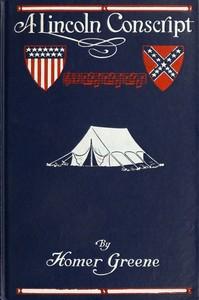

: The Boy Scouts of the Field Hospital by Shaler Robert - Strikes and lockouts Juvenile fiction; Mystery and detective stories; Boy Scouts of America Juvenile fiction; First aid in illness and injury Juvenile fiction; Military hospitals Juvenile fiction
